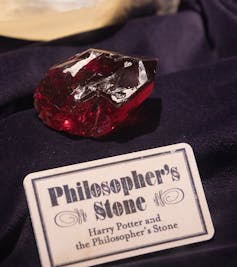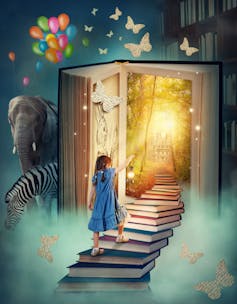Why the ancient promise of alchemy is fulfilled in reading
- Written by Elisabeth Gruner, Associate Professor of English, University of Richmond
Within a 20-minute walk from Notre Dame Cathedral, in the 3rd arrondissement of Paris, is the oldest house in the city: the house of Nicolas Flamel. If the name rings a vague bell, perhaps it’s because you read J. K. Rowling’s “Harry Potter and the Sorcerer’s Stone[1]” or, as it’s known outside the U.S., “Harry Potter and the Philosopher’s Stone.” Nicolas Flamel creates the philosopher’s stone of the title – and he was, in fact, a historical person[2].
The philosopher’s stone, the magical goal of alchemical research, was reputed to be capable of transmuting lead into gold and – of importance to Lord Voldemort in Harry Potter — brewing an elixir of life. Flamel, a wealthy Parisian bookseller and scribe, built his house in the early 15th century, and it is now associated with his legendary status as an alchemist. The menu at the restaurant on the first floor – Auberge Nicolas Flamel[3] – promises patrons to “Transform banal reality into poetic, miraculous fiction and perfect the material. That is alchemy.”
While I’m neither chef nor chemist, I’m fascinated by alchemy, by the magical transformations that Rowling and others write of. In my study of fantasy literature, I have found that writers return again and again to alchemy – but why?
The roots of modern chemistry
 The philosopher’s stone on display at the ‘Making of Harry Potter’ tour at Warner Bros. Studio in Leavesden, U.K.
Craig Russell/Shutterstock.com[4]
The philosopher’s stone on display at the ‘Making of Harry Potter’ tour at Warner Bros. Studio in Leavesden, U.K.
Craig Russell/Shutterstock.com[4]
As far as we know, neither Flamel nor anyone else ever did in fact create a philosopher’s stone. But in the history of alchemy[5] lie the roots of modern chemical science. While for centuries alchemy was derided as a pseudoscience practiced only by charlatans and cheats, some contemporary historians of science[6] recognize that in a pre-modern world, alchemy laid the groundwork for what later became empirical science. But alchemy never went away.
Rather than fading into the background of the history of science as yet one more discarded pseudoscience, alchemy retains a powerful hold on the imagination. While phrenology (the “science” of reading personality from bumps on the head) and the theory of the humors (which suggested that liquids in the body such as phlegm and bile were associated with both emotions and the four elements of earth, air, water and fire), have mostly disappeared, alchemy remains. And it recurs especially in fantasy literature such as the Harry Potter books.
Why is alchemy so fascinating? I think it’s because it suggests that there’s something magical in the lab: the possibility of utter transformation, of turning something worthless into something valuable. We know in our bones that lead isn’t gold – that they are unalterably separate. That’s why they appear in the periodic table, after all: Each is an element, one of the irreducible components of matter. We know they can’t change – but what if they could?
The magic of transformation
 People of all ages can be transformed and transported through reading.
Elena Schweitzer/Shutterstock.com[7]
People of all ages can be transformed and transported through reading.
Elena Schweitzer/Shutterstock.com[7]
The magic of alchemy is the magic of books, especially of the fantasy books that entrance so many young readers. Like alchemy, fantasy novels promise a kind of transformation: the bullied kid becomes a hero, the servant girl becomes a princess, lead becomes gold. In novels like “Harry Potter and the Sorcerer’s Stone” or the more recent “Strange the Dreamer[8]” by Laini Taylor, alchemy serves as a promise that true transformation is possible, even if it requires great sacrifice. The alchemist in “Strange the Dreamer” uses his own blood in the elixir, though reputedly the historical alchemists resorted to a more dispensable bodily fluid, their own urine[9].
But there’s a sleight-of-hand in the stories of transformation as they come down to us in fantasy. The transformations of fantasy stories are not, it turns out, quite so fantastical as they may seem. When Harry Potter becomes a hero, or Cinderella a princess, these are just outward revelations of their inner selves. The qualities that make them special have always been there – they just haven’t been recognized.
Most fantasy novels operate this way, it turns out: The quest hero needs to be revealed, not essentially transformed. To extend the chemical metaphor, perhaps they need to be distilled or refined through ordeals and sacrifice – to discover their true essence. Or maybe they need to come into contact with others and bond with them, as Harry does with his friends, or Cinderella does with her godmother and the prince, in order to become something even greater than their original self.
In either case, while some kind of chemical process may take place, it’s not an alchemical transformation, but rather a clarification, a refinement, a revelation.
The alchemy of reading
 The magic of reading.
Africa Studio/Shutterstock.com[10]
The magic of reading.
Africa Studio/Shutterstock.com[10]
The only example I know of alchemy in the real world is reading[11]. When we read, brain circuitry designed to process visual, linguistic and conceptual information is activated simultaneously and letters on a page become ideas and even pictures and sounds in the mind almost at once.
Learning to read is hard work, but the process, once mastered, is really almost like magic. It’s no surprise, then, that alchemy is a controlling metaphor, or a fundamental goal, in so much fiction. Alchemical transformation is the goal of literature itself.
In Taylor’s “Strange the Dreamer,” the hero isn’t the alchemist. That character is actually something of a cheat, even though he does manage to perform the transmutation of lead into gold. He follows a recipe, spills some blood and makes something new, but (spoiler alert!) he himself remains selfish and opportunistic even after he achieves his greatest success.
The hero, though, is a librarian. Reading in the dusty depths of the archive, he puts together the story of a lost civilization, reclaims its language and then joins a band of travelers in their quest to restore that world. He takes the raw materials he has found on the shelves of the library, in the pages of ancient books, and turns them into stories – and then into a new life. Auberge Nicolas Flamel is right: That is alchemy.
References
- ^ Harry Potter and the Sorcerer’s Stone (shop.scholastic.com)
- ^ a historical person (www.pottermore.com)
- ^ Auberge Nicolas Flamel (www.auberge-nicolas-flamel.fr)
- ^ Craig Russell/Shutterstock.com (www.shutterstock.com)
- ^ history of alchemy (www.britannica.com)
- ^ contemporary historians of science (www.smithsonianmag.com)
- ^ Elena Schweitzer/Shutterstock.com (www.shutterstock.com)
- ^ Strange the Dreamer (www.lbyr.com)
- ^ their own urine (www.washingtonpost.com)
- ^ Africa Studio/Shutterstock.com (www.shutterstock.com)
- ^ reading (www.harpercollins.com)
Authors: Elisabeth Gruner, Associate Professor of English, University of Richmond
Read more http://theconversation.com/why-the-ancient-promise-of-alchemy-is-fulfilled-in-reading-109497

